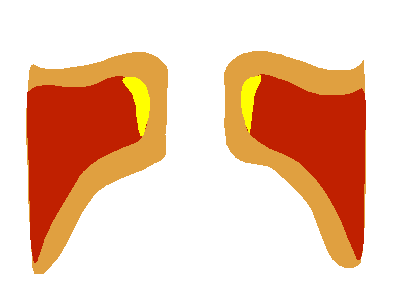Spasmodic dysphonia
(Redirected from Chronic spasmodic dysphonia)
Editor-In-Chief: Prab R Tumpati, MD
Obesity, Sleep & Internal medicine
Founder, WikiMD Wellnesspedia &
W8MD medical weight loss NYC and sleep center NYC
| Spasmodic dysphonia | |
|---|---|

| |
| Synonyms | Laryngeal dystonia |
| Pronounce | N/A |
| Specialty | N/A |
| Symptoms | Voice breaks, hoarseness, strained or strangled voice |
| Complications | N/A |
| Onset | Typically adulthood |
| Duration | Chronic |
| Types | N/A |
| Causes | Neurological disorder |
| Risks | Genetic predisposition, stress |
| Diagnosis | Laryngoscopy, voice analysis |
| Differential diagnosis | Muscle tension dysphonia, vocal fold paralysis |
| Prevention | N/A |
| Treatment | Botulinum toxin injections, voice therapy |
| Medication | Botulinum toxin |
| Prognosis | N/A |
| Frequency | Rare |
| Deaths | N/A |
Spasmodic dysphonia is a chronic voice disorder characterized by involuntary spasms of the laryngeal muscles, which cause interruptions in speech and affect the voice quality. It is a type of dystonia, a neurological movement disorder.
Types[edit | edit source]
Spasmodic dysphonia is classified into three main types based on the muscles affected:
Adductor Spasmodic Dysphonia[edit | edit source]
This is the most common form, where the muscles that bring the vocal folds together (adductors) spasm, causing the voice to sound strained or strangled.
Abductor Spasmodic Dysphonia[edit | edit source]
In this less common form, the muscles that separate the vocal folds (abductors) spasm, resulting in a breathy or whispery voice.
Mixed Spasmodic Dysphonia[edit | edit source]
This rare form involves both adductor and abductor spasms, leading to a combination of voice symptoms.
Symptoms[edit | edit source]
The primary symptom of spasmodic dysphonia is a voice that is interrupted by involuntary muscle movements. This can manifest as:
- Strained or strangled voice
- Breathy or whispery voice
- Intermittent breaks in speech
- Tremor in the voice
Causes[edit | edit source]
The exact cause of spasmodic dysphonia is unknown, but it is believed to involve abnormal functioning in the basal ganglia, a part of the brain that helps control movement. It may have a genetic component and can be triggered by stress or upper respiratory infections.
Diagnosis[edit | edit source]
Diagnosis of spasmodic dysphonia is typically made by a team of specialists, including an otolaryngologist, a neurologist, and a speech-language pathologist. The evaluation may include:
- Laryngoscopy to visualize the vocal folds
- Voice analysis
- Neurological examination
Treatment[edit | edit source]
There is no cure for spasmodic dysphonia, but several treatments can help manage the symptoms:
Botulinum Toxin Injections[edit | edit source]
Botulinum toxin injections into the affected muscles are the most common treatment, providing temporary relief by weakening the muscles and reducing spasms.
Voice Therapy[edit | edit source]
Voice therapy with a speech-language pathologist can help patients develop strategies to improve voice control and reduce strain.
Surgery[edit | edit source]
In some cases, surgical interventions such as selective laryngeal denervation-reinnervation may be considered.
Prognosis[edit | edit source]
Spasmodic dysphonia is a chronic condition that can significantly impact quality of life. While treatments can help manage symptoms, ongoing therapy is often necessary.
See Also[edit | edit source]
Search WikiMD
Ad.Tired of being Overweight? Try W8MD's NYC physician weight loss.
Semaglutide (Ozempic / Wegovy and Tirzepatide (Mounjaro / Zepbound) available. Call 718 946 5500.
Advertise on WikiMD
|
WikiMD's Wellness Encyclopedia |
| Let Food Be Thy Medicine Medicine Thy Food - Hippocrates |
Translate this page: - East Asian
中文,
日本,
한국어,
South Asian
हिन्दी,
தமிழ்,
తెలుగు,
Urdu,
ಕನ್ನಡ,
Southeast Asian
Indonesian,
Vietnamese,
Thai,
မြန်မာဘာသာ,
বাংলা
European
español,
Deutsch,
français,
Greek,
português do Brasil,
polski,
română,
русский,
Nederlands,
norsk,
svenska,
suomi,
Italian
Middle Eastern & African
عربى,
Turkish,
Persian,
Hebrew,
Afrikaans,
isiZulu,
Kiswahili,
Other
Bulgarian,
Hungarian,
Czech,
Swedish,
മലയാളം,
मराठी,
ਪੰਜਾਬੀ,
ગુજરાતી,
Portuguese,
Ukrainian
Medical Disclaimer: WikiMD is not a substitute for professional medical advice. The information on WikiMD is provided as an information resource only, may be incorrect, outdated or misleading, and is not to be used or relied on for any diagnostic or treatment purposes. Please consult your health care provider before making any healthcare decisions or for guidance about a specific medical condition. WikiMD expressly disclaims responsibility, and shall have no liability, for any damages, loss, injury, or liability whatsoever suffered as a result of your reliance on the information contained in this site. By visiting this site you agree to the foregoing terms and conditions, which may from time to time be changed or supplemented by WikiMD. If you do not agree to the foregoing terms and conditions, you should not enter or use this site. See full disclaimer.
Credits:Most images are courtesy of Wikimedia commons, and templates, categories Wikipedia, licensed under CC BY SA or similar.
Contributors: Prab R. Tumpati, MD

